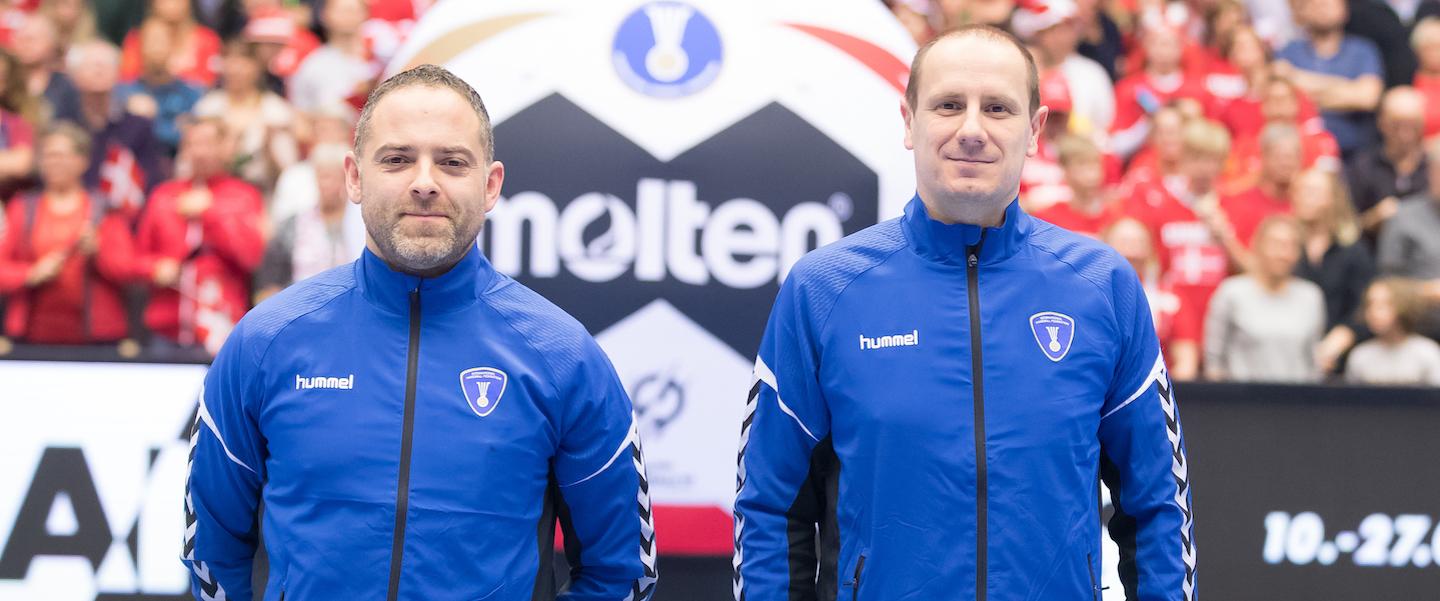IHF referees Milosevic and Gubica receive Croatia’s highest sporting recognition
28 Oct. 2020

IHF referees Boris Milosevic and Matija Gubica are among the 2020 winners of Croatia’s prestigious Franjo Bučar State Award, honouring exceptional achievements and contributions to the development of sport in Croatia. The award is the highest recognition of its kind in Croatia and follows a previous award for the pair: the Order of Croatian Interlace for exceptional contribution to the development of the reputation of the Republic of Croatia in the world through the field of sports, sports and social activities from the country’s President Kolinda Grabar-Kitarovic in June 2019. The announcement of the Franjo Bučar State Award winners was made in late October.
“I congratulate all the winners of this award, the highest recognition awarded by the Republic of Croatia for exceptional achievements and contribution of special significance for the development of sports,” said Croatian Minister of Tourism and Sports Nikolina Brnjac. “The Franjo Bučar Award is named after the father of Croatian sport, and in this completely different year, it is an additional indicator of how proud we are of everything that his successors are achieving.”
Chairman of the IHF Playing Rules and Referees Commission (PRC) Ramon Gallego acknowledged the achievement of the IHF referees.
“The IHF considers its referees as elite athletes because they train and prepare as true professional sportsmen/women in all aspects of an athlete – physically, technically and mentally. IHF referees dedicate a large part of their lives to being ready to give the adequate answer to the high demand of the great IHF events.
“The IHF and the PRC are proud when their elite referees, their elite athletes, receive the highest recognition in their countries, along with the greatest athletes from each country. In this case, congratulations to the Croatian referees Gubica and Milosevic.”
Milosevic and Gubica are recognisable to handball fans as the referees for high-profile games such as the 2019 IHF Men’s World Championship final, the EHF EURO 2018 final, three appearances at the men’s Champions League finals – the EHF FINAL4, two nominations as referees of the women’s Champions League finals, the 2011 IHF Women’s World Championship final as well as the London 2012 Olympic Games. They have been named best referees in Croatia a total of 11 times.
“For us it means that all the efforts we made in the last 20 years are recognised and awarded. Also, we feel pride and at the same time obligation to continue in the same way,” Milosevic and Gubica told ihf.info about receiving the Franjo Bučar State Award.
The efforts of the two Croatian referees have certainly been recognised with the awards, as well as through their nomination for the numerous top-level games officiated during their careers as international referees. Can they pick one game that stands out as particularly special?
“In our careers we had some interesting and nice matches, but the last one was the World Championship 2019 final match. For us, every game is a special game and we have the same approached to [all] games, as though they are finals. It would not be fair to the teams if we make a difference between games that are the final or a regular match. Each game must be a final, and we think this is a good approach and way of thinking,” say Milosevic and Gubica.
Milosevic and Gubica were among the lecturers for the 1st IHF Live Online Symposium, contributing to the global education of handball referees around the world (watch their lecture here). They have a visible interest in the continued development and promotion of handball around the world.
“For young referees, just listen, learn, watch and believe in themselves, and last but most important, be patient. For those who want to become a referee, they should know this: it's not an easy job; it’s hard work. You need to enjoy in this job, must be ready for critics and if they have positive thinking about these challenges then refereeing is for them.”
Aside from the recognition in the form of awards and nominations, the handball refereeing career has brought them positive experiences overall: “We meet new people, new cultures, you get a broader picture of life that helps you in ‘normal’ life. Throughout our career, we encountered a variety of challenges that simply drive you to be better,” conclude Milosevic and Gubica.

